With $1,000 in savings and two US government stimulus checks, Chris Zettler began investing in 2020. First he bought companies he knew, he says, “but then I got bored with it”. He moved on to call options in companies with volatile share-prices, riding the price swings. He used a win to buy 100 shares in the meme stock AMC at $30 in May and sold at about $65 in June.
The 35-year-old finance major at the University of Alabama, Birmingham, had a TD Ameritrade account that allowed him to trade on margin (borrowing money from the brokerage to amplify potential returns) and place nearly $8,000 in bets with his original $4,000 of capital. He turned that into $18,000.
Zettler saw his account balance rise to $50,000 before falling to $35,000 when a bet went sideways. He sold $20,000 of shares and paid his college tuition fees: “I got lucky as heck,” Zettler says.
Yet the risk was worth it, he adds. The possibility of making outsized returns outweighed the risk of loss: “If I did it again, would I have done it the responsible way and just sat on that $4,000? Shoot, no . . . You don’t have anything to lose so you might as well shoot your shot.”
Zettler is part of a generation of investors who came of age around the 2008 financial crisis and in its aftermath. Having struggled to accumulate wealth through traditional means over the past decade, many have turned to speculating in the riskier corners of financial markets.
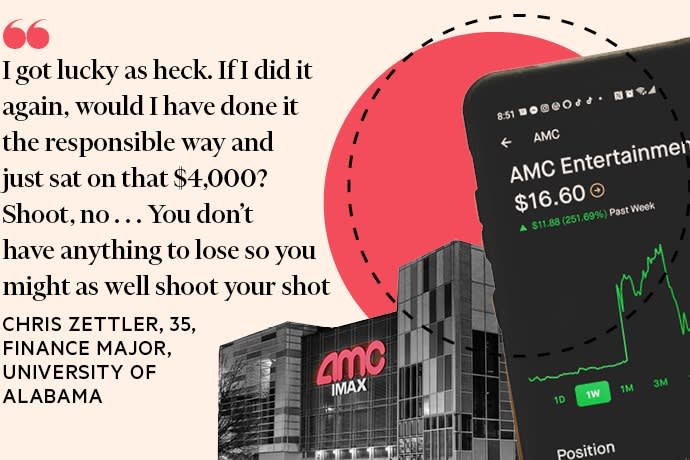
Experts say the growing appetite for speculative assets such as cryptocurrencies, NFTs and “meme stocks” (whose value skyrocketed in early 2021, driven by retail traders and social media hype) is about more than just getting rich quick.
Stagnant wages, rock bottom interest rates, soaring house prices — and now, corrosive inflation — have cut away at the idea that the under-40s can follow the well-trodden path to financial security that their parents took. Younger investors report feeling like the game is rigged and that playing by the old rules is a losing strategy.
In recent months, a combination of inflation and rising interest rates have shaken the crypto markets. Crashing coin prices and the high-profile bankruptcies of crypto lenders and hedge funds have exposed the dangerous practices that flourished in the riskiest areas of the market. The question now is whether the younger DIY investors will retreat.
Zettler’s experience suggests not. He has watched his peers chase desperate bets on cryptocurrencies and volatile stocks hoping to ride the next wave to riches. “A lot of people view it like they can’t afford not to,” he says. “I think they’re running out of hope.”
Fear, uncertainty and doubt
Natasha Schüll, a cultural anthropologist at New York University, blames the increased appetite for risk on a widespread disillusionment with the notion that economic success is accessible to anyone who works hard enough. Part of the appeal of cryptocurrencies and meme-stock runs is that they are anti-establishment, designed to operate outside the rules of the traditional financial system.
“The idea that the mainstream economy is trustworthy, more so than these other [assets], is kind of dubious in recent experience,” she says. “There has been more and more willingness to say, ‘fuck it’.”
The appetite for high-risk speculation is particularly sharp among Americans, who tend to have high levels of personal debt, researchers say. The average US student now graduates with $37,000 in student debt — up from $17,000 in 2001.
“The idea is that you’re supposed to be able to save money for college, but almost no middle-class family can in a significant way,” says Caitlin Zaloom, a professor of social and cultural analysis at NYU. “There isn’t enough financial stability at the core of people’s lives. If there was, there would be little incentive to speculate.”
Rent rises have outpaced income growth in most US states since 2001, according to estimates by the Center on Budget and Policy Priorities. And inflation has pushed the cost of living higher in recent months. As low interest rates and heavy debt became a fact of life, relationships with risk changed, experts say. Young investors are less likely to approach speculative financial products as investments with underlying value. Rather, they are inclined to treat them like lottery tickets — probably worthless, but still worth the gamble on a life-changing payout.
“If you had lottery tickets for houses, investors would buy some of those, too,” says Jeremy Grantham, co-founder of the Boston-based asset management group GMO. “There is enormous inequality, and when people get fed up . . . they start to behave in strange and new ways.”
The logic is simple, says Ben Johnson, head of exchange traded fund research at data provider Morningstar: “Negative real yields? No, thank you. What are the alternatives? JPEGs of monkeys and fake internet money? It’s not surprising that investors feel like they’re stuck between NFT pet rocks and a hard place.”
The discontent isn’t limited to the US. A majority of British 35-year-olds surveyed by the insurance company Urban Jungle reported feeling at an “unfair disadvantage to the generations directly before them” when it comes to financial stability and savings.
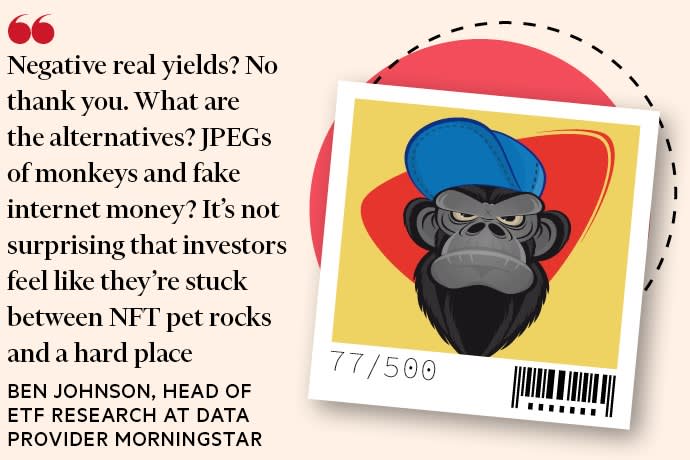
Gary Stevenson, a 35-year-old former trader and financial education campaigner from east London, is one: “My dad never went to university. He worked at the post office for 35 years and could raise three kids and pay off [a mortgage] . . . he has a comfortable retirement,” he says. “That is off the table for most young people now. It’s created a bit of a panic.”
“If you can’t do what your dad or grandad did . . . you have to come up with a better plan,” he adds. At some point, risky bets starts to look like the rational choice: “One way, you see a zero per cent chance of success. But if you take on insane risk . . . at least you have a chance.”
To the moon
During the meme stock frenzy of early 2021, stories of huge returns fuelled a rush of new trading. Some people won big. An investor who bought GameStop in late December 2020 could have turned £10,000 into £168,744 in a single month when the meme stock hit its peak on January 29 2021 — an almost 1,600 per cent gain. But there was also the potential for huge losses: an investor who bought at the top and then sold in late February would have shrunk the same £10,000 into £3,129 in a month, following a 69 per cent plunge, according to Boring Money analysis.
Even so, many young investors reject the “dumb money” label applied to their trades. They say the odds are worth the punt, given the alternatives. Many investors remember the unequal recovery from the 2008 crisis when government bailouts, followed by a decade-long bull run in markets, left the uninvested behind. When markets tumbled as Covid-19 hit in March 2020, they didn’t want to miss out a second time. New technology meant there was never an easier time to get involved.
The introduction of commission-free trading in stocks in the run-up to the pandemic added momentum to lottery-like investing behaviour. In 2015 the zero-commission brokerage Robinhood was launched, promising to “democratise” financial markets. Four years later, almost every US-based broker had eliminated commissions for equity trading. Robinhood’s game-like app allowed customers to sign up and start trading stocks on their phones within minutes.
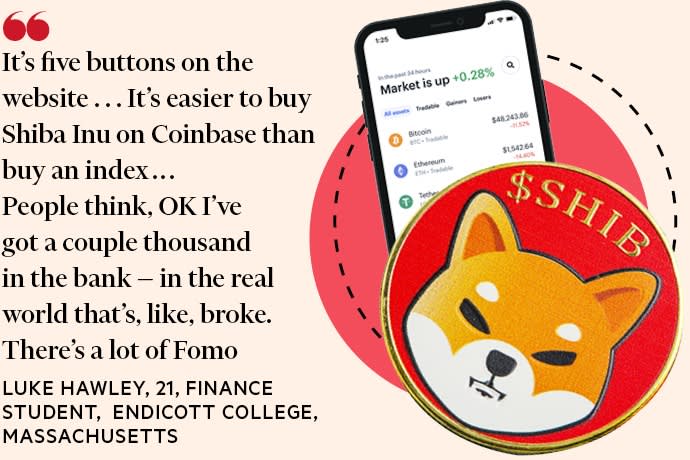
Slick cryptocurrency exchanges such as Coinbase emerged as the number of digital coins on the market exploded. A “meme coin” craze driven by super-influencers such as Elon Musk introduced an avalanche of outlandish offerings — from those named after celebrities (Coinye West) to the “dog coins” Shiba Inu and dogecoin. In April 2013, there were just seven cryptocurrencies available for mining and trading. Today, there are tens of thousands.
Getting involved was simple. “It’s five buttons on the website,” says Luke Hawley, a 21-year-old going into his senior year at Endicott college in Massachusetts who studies finance. “It’s easier to buy Shiba Inu on Coinbase than buy an index.”
Hawley says it has become normal on his college campus to talk about betting and speculating. “People think, ‘OK I’ve got a couple thousand in the bank — in the real world that’s, like, broke’,” he says. “There’s a lot of Fomo,” he adds, about the idea of passing over a chance to turn a small stake into big money.
Young men in particular have been attracted to this kind of moonshot investing. The vast majority of cryptocurrency investors are men and more than 90 per cent of trades in Gamestop and AMC were made by men during the peak of the meme stock frenzy, according to the UK brokerage Interactive Investor. Experts say one reason these investments are treated like casual bets is because the brokerage apps feel like gambling platforms — only without the regulatory guardrails.
“Increasingly platforms are blurring the line between gaming, gambling and investing, especially platforms that enable the use of cryptocurrency,” says Jack Symons, chief executive of the UK app Gamban, which allows users to block gambling apps on their phones and computers. Gamban began to block brokerage and crypto platforms last summer. “Some might say this is a blunt approach, but gambling doesn’t look like it used to. It’s not something that only happens [in a casino] on green felt,” Symons said in October.

Late last year, the largest American gambling hotline told the Financial Times it was seeing a marked increase in the number of calls coming from people addicted to day trading, rather than traditional gambling or sports betting. One reason might be that, as Stevenson explains, investing does not carry the same social stigma as gambling.
“If you said, ‘My dad spends all day gambling,’ [I’d] say, ‘Oh man I’m so sorry for your family’,” he says. But “if someone says, ‘My dad spends all day FX trading’, you think he’s the Wolf of Wall Street . . . It’s not gambling, it’s investing — and investing is how you get rich.”
Diamond hands
In recent months, as the air has rushed out of the cryptocurrency balloon, the most speculative parts of the market have been hardest hit. But as prices crashed, attempts by some crypto companies to persuade investors to keep faith and hold on through what they dismissed as just another cyclical “crypto winter” shows the growing power of online communities.
The under-25s are twice as likely to turn to social media for financial advice than any other age group, and more than three times as likely to do so than to seek help from a professional, according to a survey by UK advisory OpenMoney.
Robinhood’s rise happened as online communities on Twitter and Reddit began to play a bigger role in investing. Reddit subforums such as r/WallStreetBets provided specialist information for would-be investors, facilitated their discussions and plucked at their heartstrings.
Big losses could be laughed off with peers and big gains shared and celebrated. Those who held their nerve were lauded for their hubris: “diamond hands” became the emoji-vernacular for holding tight to a bold position even when it collapses.
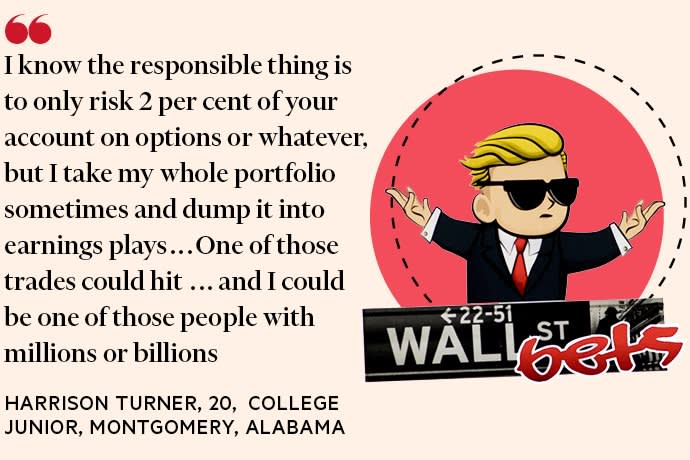
A study by academics at the University of Sydney last year found that people aged between 18 and 24 were much more likely to make risky decisions when they thought their peers were watching. Agnieszka Tymuła, the lead researcher on the study, says online communities of investors amplify the same behaviour: “People want to take risks, to get that big win and post about it.”
The illusion of control also amplifies risk taking. Whether by laying out the specifics of niche cryptocurrencies, or discussing “moonshot” strategies, web forums encourage members to feel that the odds of winning are significantly greater than they actually are. Regulation has not kept up with the spread of misinformation.
Some college students say they are increasingly familiar with the dangers of cryptocurrency “pump and dump” schemes such as so-called rug-pulls — when a developer launches a cryptoasset, drives the price up via social media influencers and then disappears with their gains before the price collapses.
“It’s not pretty being on the back end of a rug-pull,” says Harrison Turner, a 19-year-old rising college junior from Montgomery, Alabama. Still, he says, he understands the influencer’s motivation: “He saw an opportunity and he took it.”
Get rich slow
Despite the increasingly hostile investing environment, high-risk speculation may be here to stay. “It worked spectacularly well for some people, and old habits die hard,” says Steve Sosnick, chief strategist at US trading platform interactive brokers. “They’re still using margin to speculate, even as rates go up.”
In May, the amount of money borrowed to trade on margin was 25 per cent above pre-pandemic levels, data from Finra shows.
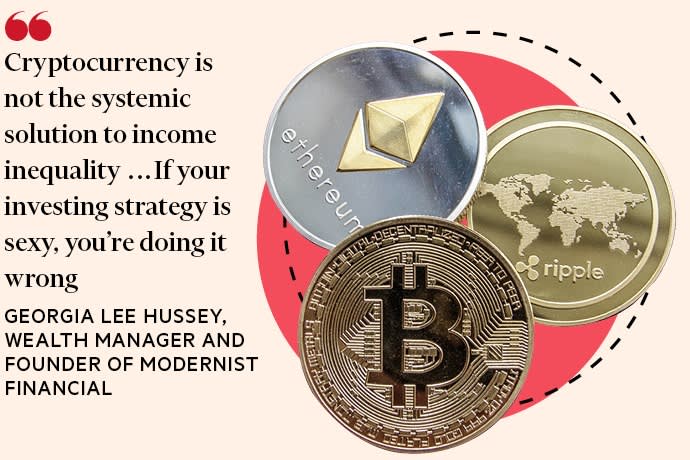
Traditional wealth managers are uneasy about the prospect of digital assets going mainstream. Nearly half of fund selectors say they feel pressure to offer cryptocurrencies to attract younger investors, according to research by Natixis. Yet 70 per cent say they think individuals should not have exposure to the volatile asset.
“Cryptocurrency is not the systemic solution to income inequality,” says Georgia Lee Hussey, a wealth manager and founder of Modernist Financial. “If your investing strategy is sexy, you’re doing it wrong.”
Brokerages are also worried that investors burnt by big losses could retreat from markets entirely, reinforced in their view that the game is rigged. Attempts to educate potential clients means reaching investors where they are — on social platforms. Fidelity has embraced both digital assets and social media outreach in an effort to connect with investors and convince them it is possible to get rich slow.
“Young investors report that their top concern is their financial security — how to have enough to be ‘OK’,” says Kelly Lannan, head of emerging customers at Fidelity. “It’s very basic . . . We hear that more with this generation.”
While Zettler says he has become more “boring” with his investments, others like Turner are still comfortable risking it all. He has already lost his brokerage funds once by mistiming a meme-stock bet, but says he can always earn enough to put a few thousand dollars in a brokerage account. “The money will come and go,” he says. He knows he could lose it all.
Then again, he says, he could get lucky.